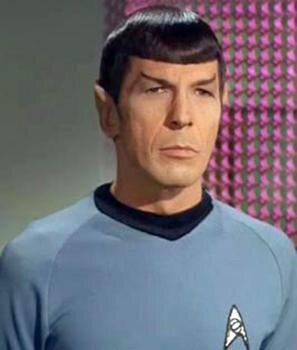Spock or Troi: Which Are You?
Are you a thinker or a feeler? Well, of course you are both. We all use our brains to logically analyze problems, employ cause-and-effect reasoning, and distinguish between what is true and what is false. Likewise, we all use our hearts to empathize with others, make emotional connections with people, and evaluate between actions that will help or hurt others.
When it comes to personality type, however, we are really talking about preferences. And the preference of thinking or feeling is fundamentally about how you prefer to make decisions.
Two Star Trek characters epitomize these two decision-making dichotomies: Commander Spock, the eternally logical, somewhat emotionless, science officer of the classic show’s Starship Enterprise; and the Next Generation’s Deanna Troi, the kind, empathetic ship’s counselor, who is ever ready to listen to and help any crew member in need of a sympathetic ear.
Spock could always be counted on to be the voice of reason, providing a thoughtful, logical counter-balance to the vibrant and impulsive Captain Kirk or the cantankerous yet compassionate Dr. McCoy. Spock would analyze any situation objectively and provide the one most reasonable, rational solution.
Spock’s analytical personality was partly genetic. His father was Vulcan, a race of people whose culture was devoted to logic, learning, and the suppression of emotions. However, his mother was human, and she provided the emotional side of him, which he expressed surprisingly often throughout the show, especially in his fondness for his friends.
Deanna Troi was also half-human, but on her mother’s side she was a Betazoid, a race of empathic people who could actually feel what others felt. This skill enabled Troi to be a superb counselor, literally empathizing with her patients and able to get to the heart of whatever was bothering them. She was usually the only person on the ship that the stoic ship’s captain, Picard, felt he could talk to openly, and she often counseled him to search his heart for the right thing to do.
However, when she had to, Troi could make the hard decisions. She knew that sometimes she had to get tough with people in order to help them, and as a good Starfleet Officer, she followed the rules and obeyed orders.
Interestingly, both characters, who could have been a caricature of a thinker or feeler based on their alien race, were both half-human, providing a balance to their personalities that made them much more interesting. Likewise, we all have a little bit of Spock and Troi in us, and none of us is all thinker or feeler. But I bet you can relate to one more than the other.
So when you have to make a decision that may affect other people, are you more like Spock? Do you prefer to step out of the situation and look at it as an objective observer? Do you consider the logical consequences of your decision, carefully weighing the pros and cons, and trying to keep emotional considerations out of your deliberation? Do you look at the rule or law and then decide that you need to apply that law equally and fairly to everyone, not playing favorites?
Or when you have a decision to make, especially one that affects others, are you more like Troi? Do you prefer to step into the situation, putting yourself in everyone else’s shoes? Do you naturally empathize with what everybody else is feeling, considering the emotional impact of your decision and how it will affect the personal relationships and morale of those involved? Do you look inwardly at your own value system first to make your decisions, even if those values may conflict with an external rule or law? Does your definition of fairness mean looking at individual situations and customizing your decisions based on a particular person’s needs?
You probably do both. But which comes first? Which is more important to you?
Watch the following video if you still aren’t sure if you have a bit of Vulcan or Betazoid blood in you, and then boldly go and embrace your natural savvy!


